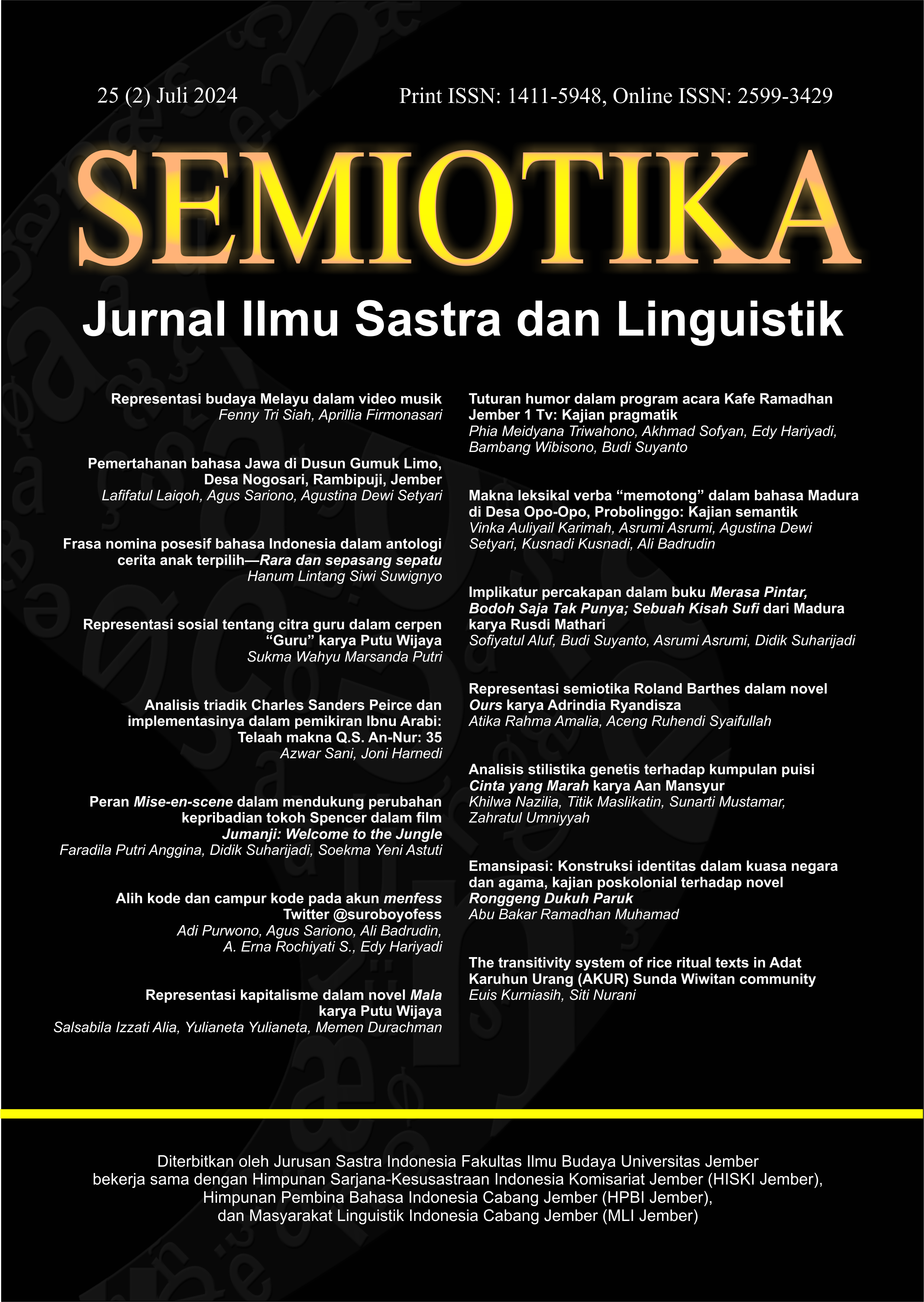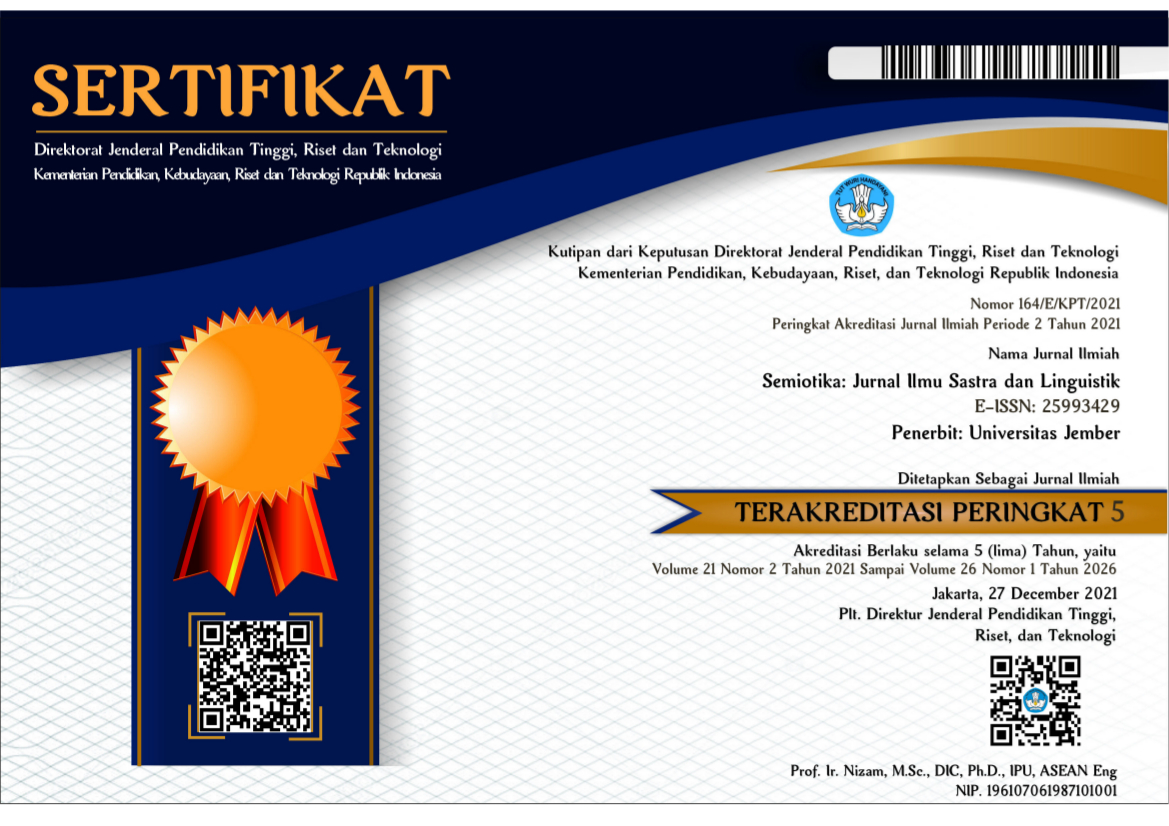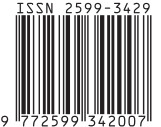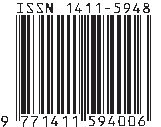Emansipasi: Konstruksi identitas dalam kuasa negara dan agama, kajian poskolonial terhadap novel Ronggeng Dukuh Paruk
Abstract
This article explores the power of the state and religion in constructing identity within the context of emancipation discourse, as depicted in Ahmad Tohari's Ronggeng Dukuh Paruk (RDP) trilogy—Catatan Buat Emak, Lintang Kemukus Dini Hari, and Jentera Bianglala (2003). The central assumption is that the hegemony of emancipation discourse represents a culturally postcolonial space. Emancipation, in this context, refers to the civilizing of marginalized groups, portrayed as "enlightened subjects" by other entities—the state and religion—which are presented as "the enlighteners" through the text. The novel, as a representation of modern culture, is understood to incorporate colonial discourse aimed at exerting control, particularly through the rhetoric of emancipation. This article employs postcolonial theory with a "travelling theory" method rooted in deconstruction. The application of this method aims to examine the ideological aspects of colonial discourse hegemony within narratives or texts concerning the power of the state and religion in identity construction—both as a continuing impact of colonialism and as resistance to it. The findings reveal that the RDP trilogy illustrates emancipation discourse through the power of the State and Religion in the context of 'civilization' and 'Divine Will.' However, this effort creates a paradox. On one hand, it offers a transformation toward a civilized life based on "Divine Will." On the other hand, it reinforces colonial stereotypes, positioning Dukuh Paruk's tradition as uncivilized. This ambiguity demonstrates that emancipation discourse remains trapped within colonial hierarchies of power. In postcolonial studies, emancipation discourse is thus understood as a postcolonial space related to civilizing projects through which the codification of language and the power of the state and religion (colonial) "control" the identity of marginalized groups via a series of semantic fields in the selected work.
References
Cavallaro, D. 2001. Critical and Cultural theory; Thematic Variations. London: The Athlone Press. Diterjemahkan dalam judul: Teori Kritis dan Teori Budaya. 2004, oleh Laily Rahmawati. Yogyakarta: Niagara.
Eagleton, T. 2006. Literary Theory: An Introduction (2nd Edition).Massachusetts: Blackwell Publisher;
Faruk. 2010. Pengantar Sosiologi Sastra, dari Strukturalisme sampai Post-modernisme. Yogayakarta: Pustaka Pelajar.
Gandhi, L. 1998. Postcolonial Theory A Critical Introduction. London: Allen and Unwin. Diterjemahkan dalam judul: Teori Poskolonial: Upaya Meruntuhkan Hegemoni Barat. 2001, oleh Yuwan Wahyutri dan Nur Hamidah. Yogyakarta: Qalam.
Gunawan, E. 2017. “Relasi Agama dan Negara: Perspektif Pemikiran Islam”. Jurnal Kuriositas, 11(2). https://doi.org/10.35905/kur.v10i2.589
Jemmy, J. 2019. “Feminisme dalam Novel Ronggeng Dukuh Paruk karya Ahmad Tohari dan Novel Sunyi di Dada Sumirah karya Artie Ahmad”. Tesis. Makassar. Universitas Muhammadiyah – https://digilibadmin.unismuh.ac.id/upload/9117-Full_Text.pdf
Kartodirdjo, S. 2005. Sejak Indische Sampai Indonesia. Jakarta: Kompas Media;
Liswi, H. 2018. “Kebutuhan Manusia terhadap Agama”. Jurnal Pencerahan.12(2), 201-223. Retrieved from https://jurnalpencerahan.org/index.php/jp/article/view/27
Loomba, A. 2000. Colonialism/Postcolonialism. New York: Routledge. Diterjemamahkan dalam judul; Kolonialisme/Pascakolonialisme, 2003, oleh Hartono Hadikusumo. Yogyakarta: Bentang Budaya;
Mulyaningsih, I. 2015 “Kajian Feminis pada Novel Ronggeng Dukuh Paruk, dan Perempuan Berkalung Surban”. Jurnal: Pendidikan Bahasa dan Sastra Indonesia (ILEaL). 1(1). DOI : 10.24235/ileal.v1i1.75.
Memmi, A. 1967. The Colonizer and The Colonized. Boston, MA. Beacon Press;
Nurpajriani, A. A. & Hamdani, A. 2024. “Kajian Novel Ronggeng Dukuh Paruk Karya Ahmad Tohari Dengan Menggunakan Pendekatan Eminisme”. Caraka: Jurnal Pendidikan Bahasa dan Sastra Indonesia serta Bahasa Daerah, 13(1).
Rusdhie, S. 1995. The Moor’s Last Sigh. London: Jonathan Cape;
Said, Edward W. 1989. Orientalism. New York: Vintage Books. Diterjemahkan dalam judul: Orientalisme. 2001, oleh Asep Hikmat. Bandung: Pustaka.
Said, E.W. 1993. Culture and Imperialism. London SW1V 2SA, 20 Vaxhaull Brigde Road: Chatto and Windus Ltd. Diterjemahkan oleh Rahmanti Astuti, 1995 dalam judul: Kebudayaan danKekuasaan oleh Rahmani Astuti. Bandung: Mizan;
Said, E.W. 2001. Power, and Culture: Interview With Edward W. Said. New York; Pantheon Books. Diterjemahkan oleh Hartono Hadikusumo dan E. Setiyawati Alkhatab, 2003, ke dalam judul: Kekuasaan, Politik, dan Kebudayaan. Bandung: Pustaka Promethea
Smith, L.T. 1999. Decolonizing Methodologhies, Research and Indegenous People. London: Zed Books. Diterjemahkan dalam judul: Dekolonisasi Metodologi – 2005 oleh Nur Cholis. Yogyakarta: INSIST press.
Sodikin, R., A. 2003. “Konsep Agama dan Islam”. Jurnal Al Qalam, 20(2). DOI: https://doi.org/10.32678/alqalam.v20i9
Tohari, A. 2003. Ronggeng Dukuh Paruk - Trilogi. Jakarta: PT Gramedia Pustaka Utama.
Triwulan, A., Prasetyo, R., S. & Winarish, L. T. 2022. “Kajian Sosiologi Sastra dalam Novel Ronggeng Dukuh Paruk Karya Ahmad Tohari”. Jurnal Pena Indonesia, 8(2):1–16. https://doi.org/10.26740/jpi.v8n2.p1-16.
Turner, B., S. 2006. Runtuhnya Universalitas Sosiologi Barat: Bongkar Wacana Atas Islam Vis A Vis Barat, Orientalisme, Postmodernisme, dan Globalisme. Yogyakarta: Ar-Ruzz.

This work is licensed under a Creative Commons Attribution-ShareAlike 4.0 International License.
SEMIOTIKA has CC-BY-SA or an equivalent license as the optimal license for the publication, distribution, use, and reuse of scholarly work. Authors who publish with this journal retain copyright and grant the journal right of first publication with the work simultaneously licensed under a Creative Commons Attribution-ShareAlike 4.0 International License that allows others to share the work with an acknowledgment of the work's authorship and initial publication in this journal.
Attribution-ShareAlike
CC BY-SA










